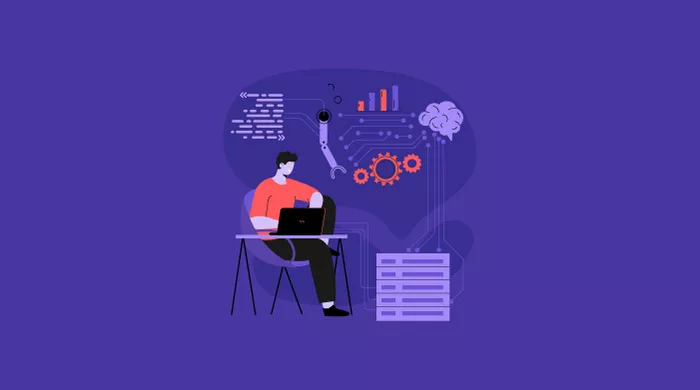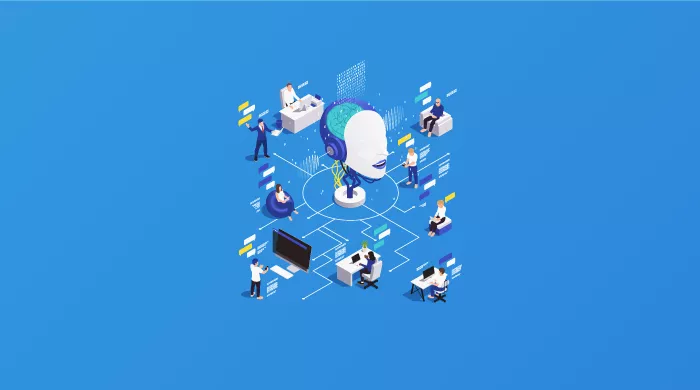Series of AI blogs | Ep 3 - Healthcare Industry (Dementia and Alzheimer's Disease) | Preserving the Moments That Are Memories
‘We need to design and build AI that helps healthcare professionals be better at what they do. The aim should be enabling humans to become better learners and decision-makers.’ - Mihaela van der Schaar, PhD, director of the Cambridge Centre for AI in Medicine at the University of Cambridge in the U.K. (The Guardian)
AI in Healthcare
Ever since the inception of Earth, humans have succeeded in finding vaccines, remedies, and treatments for almost every disease. There are only a few handful of conditions which have no cure. But AI is here to fill that gap.
Nothing pains a person more than their parents or spouse with whom they have spent decades, forgetting who they are and having to remind them repeatedly. AI is more than a science fiction movie now, which is why healthcare organizations should try to employ artificial Intelligence even if it helps one dementia patient not to lose the battle with Alzheimer's.
September is World Alzheimer's Month, which makes it a perfect month to write and publish about Dementia and how AI in Healthcare is helping detect it and treat it(in a way). Some of the best healthcare AI companies can help organizations save more lives.
But before that, let us learn what Dementia is and how it can worsen to Alzheimer’s.
Dementia?
According to alz.org, Dementia is not a disease but an umbrella term under which many diseases fall, including Alzheimer's, Dementia with Lewy bodies (abnormal deposits of protein inside nerve cells), and a group of conditions that contribute to frontotemporal Dementia (which means slow disappearance of the frontal lobe of the brain).

It causes abnormal brain changes, which might or might not damage cognitive(thinking) ability. And it eventually leads to Alzheimer’s. But what is Alzheimer’s Disease?
Alzheimer’s Disease (AD)!
‘Alzheimer’s is not a loss of intelligence, but a loss of memory.’ - Anonymous
Alzheimer's is not a routine of aging. Like with aging, a person feels weaker because it is normal, but Alzheimer's is not. It is a progressive disease that worsens over a period of time. Their Dementia starts with mild memory loss, but with the passage of time, a person finds it hard to carry a conversion or does not know how to respond to the atmosphere.
Most people who are in their mid-60s fall victim to this disease, but sometimes even younger people are not saved from it as well. However, a person below the age of 65 affected by Alzheimer's is called younger-onset or early-onset. Although it is rare, it exists and starts as early as the mid-30s.

…the three stages of Alzheimer’s(or four)
There are three stages of Alzheimer’s, according to nia.nih.gov: Mild stage, Moderate stage, and Extreme stage. But there is one more stage, which is known as the Preclinical Stage.
Preclinical Stage
Research has shown that the complex brain changes like the formation of amyloid plaques or tau tangles are associated with Alzheimer's and start a decade before cognitive issues appear. It is called the preclinical stage of Alzheimer's, where the brain changes show before the onset of Dementia. But it is also essential to notice that not everyone with this issue develops Dementia.
The Mild Stage
A person with mild symptoms of Alzheimer's is healthy, but they have trouble making sense of the world because they keep forgetting tinier things. They realize that something is wrong but cannot put a finger on it. Some of the problems are:

Alzheimer’s is diagnosed at this stage if the family member of a person is aware enough to understand what is happening. People living alone might have difficulty dealing with such a situation.
The Moderate Stage
The person diagnosed with Alzheimer's is put under care and observation. This stage is called the Moderate Stage. Here, family members are involved because it is hard to put up with Alzheimer's patients. Because they lose more than primary memory. Some of the problems faced by patients with moderate symptoms are:

Alzheimer's at this stage could be extremely difficult for family members, which is why patients are often transferred into facility care. Even though they are not entirely dependent on other people for their lives, it is difficult for them to survive independently.
The Extreme Stage
An Alzheimer's patient with an extreme stage is utterly dependent on others for their life. As mentioned above, this is a progressive disease that worsens with each passing day, and by the end of their time, they are bedridden, and their body shut off. Here are some of the problems faced by Alzheimer's patients in the extreme stage:

While there is no concrete treatment for Alzheimer's, there are a few US FDA-approved medicines that can help with the disease. This is where Medical Artificial Intelligence comes into the picture. It can do what humans can't.
The research for Alzheimer’s and Dementia with AI are transpiring already, and primary success has been achieved with early diagnosis of Dementia, for which the case study and research study are hereafter laid down.
And there is a hope that AI will further assist with eradicating Alzheimer's from existing with the extraction of images - voxel-based, slice-based, patch-based, and regions-of-interest (ROIs).
Dementia AI Case and Research Studies
Artificial Intelligence can reach where humans can't, which is why research and studies have shown how AI in the Healthcare sector can help detect patients at an early stage.
Case Study: Researchers at the Max Planck Institute for Human Cognitive and Brain Sciences and the University of Leipzig Medical Center employed AI to detect Dementia.
When the patient was brought in for the check-up, he was shown pictures of animals and other things, but unfortunately, he was unable to recognize them. Matthias Schroeter and his colleague Leonie Lampe employed machine learning techniques to figure out the problem with patients.
They were able to conclude that the rare forms of Dementia and even Alzheimer's can be tested early with the help of AI. Before, when Artificial Intelligence wasn't in the picture, they were able to distinguish healthy patients from the ones showing symptoms of Alzheimers but that was it.
With the help of AI, they could over this limitation and detect the orphan diseases, which are detected late, lest alone obtain the treatment.
Research Study: According to research conducted by Boston University, AI algorithms can accurately predict Alzheimer's.
The researchers tried developing an AI algorithm that can predict the risk for and diagnose Alzheimer's disease with the help of the combination of brain magnetic resonance imaging (MRI), testing to measure cognitive impairment, along with other demographic details.
The researchers had obtained first - hand raw medical details of four individuals showing signs of Alzheimer's. Then, the data of one of the subjects was used to create a novel deep-learning model that can predict the risk of Alzheimer's.
Post that, the international team of experts - neurologists were called to perform the Alzheimer's test on the subjects.
However, AI has predicted the results accurately, which were as good as an average neurologist. And the researchers concluded that if the models like the ones they have created are available, then with the help of MRI data and other medical details, they can assist clinical practices in determining Alzheimer's.
…and here is how medical artificial intelligence can help preserve moments that are memories:
Even though tremendous progress has been made toward detecting Alzheimer's disease pathology using CSF biomarkers, PET amyloid, and tau imaging; these modalities often remain limited to research contexts.
The studies have demonstrated the application of deep learning approaches such as convolutional neural networks (CNNs) for MRI and multimodal data-based classification of cognitive status have shown impressive results, although with a few limitations.
The Medical Artificial Intelligence does and will be able to help the patients of Dementia as well as Alzheimer's in the following ways:
1. In the Early Diagnosis:
Initially, even the experts used to have difficulty diagnosing Dementia let alone figuring out it could turn into Alzheimer's. But with the help of AI neuroimaging, experts are able to predict it before it worsens, provided the patient is brought in, on time.
Apart from neuroimaging, the neurologists also conduct cognitive tests, speech assessments, and dementia screenings like the clock drawing tests, and the data filled in the Deep Learning and Machine Learning Software provide accurate results.
Quantib.com also states that a Canadian Medical Imaging Company has developed a technology with the help of AI, which captures retina scans to check the presence of amyloid buildup. It is a type of protein present in the patient in the early stages of Alzheimer's.
2. For the Treatment Research:
There might not be a cure for Dementia at present, but AI in Healthcare will make it possible. Up until then, AI-supported the research, which is aimed to refrain the disease from progressing. The experts believe that it has the potential to select the drugs to treat Alzheimer's by attacking the effects it has on the brain, like plaque.
There are a limited number of treatment options for the subjects in clinical trials because most participants are far too long in the disease. However, AI could fastrack the process of treatment by identifying subjects in the early stage, and thus by providing the treatment on time, yielding positive results.
It will also help with selecting the subjects for clinical trials with the help of real-time tracking, which again, interestingly, is a feature of Artificial Intelligence.
3. For Post - Diagnosis Support:
The patients detected of severe Alzheimer’s need to rely on others to live. Even though the technology will not be able to replace human beings, it will most certainly reduce the dependency of patients on their families which could be a hassle for both the parties.
With the existence of smartphones, the patients will be able to manage routine tasks like eating, sleeping, remembering addresses, etc. Also, the patients who are admitted to a care facility will be better-taken care of by the nurses if they can keep track of many patients at a time.
4. AI Storytelling:
According to a study conducted by strath.ac.uk, they are working on a project named AMPER - Agent-based Memory Prosthesis to Encourage Reminiscing. As people diagnosed with Alzheimer's face memory loss in reverse chronological order, this AI-driven approach will use personalized storytelling to preserve the moments that are momories.
The science of Medical Artificial Intelligence, put together with the art of storytelling will help patients remember what they have forgotten.
Along with that, ChatGPT can help the patient stay in constant communication with the technology to avoid feeling isolated. It leverages its advanced natural language processing capabilities to design personalized and interactive conversation assistance, helping users maintain their independence and improve their overall quality of life.
5. Monitoring Progress Through AI wearables:
Monitoring the progress of Alzheimer's patients is a must because the disease worsens with time. Thus, AI-powered smart wearables like smartwatches, smart glasses, smart belts, smart socks, smart shirts & pants, etc., help track how the patient is doing and what can be done to make their life even more accessible.
With the help of these devices, they can be reminded to complete basic chores like eating, bathing, taking medicines, going for walks, etc. And eventually it becomes routine. Thus, wearable devices help patients form a habit of taking care of themselves to the point that it is ingrained in their muscle memory to follow a healthy routine.
When the patient has Alzheimer’s attack in a public place or private, the notification is sent to the nearby hospital or medical care that can reach the patient on time and provide the required assistance. Also, it helps the concerned doctor to keep in touch with the patient round the clock and be on their toes when they are called for.
Conclusion:
Artificial Intelligence is here to stay. It has already helped fields such as aviation, fashion, etc. progress, it will be worth it, when lives are saved with the help of Medical Artificial Intelligence.
In 2019, the dementia mortality rate was more than 1.5 million (dementiastatistics.org), and is expected to increase to 150 million by 2050 (researchgate.net). But such might not happen if Artificial Intelligence intervenes.
It is so beautiful and emotional to watch someone with Dementia remember their children out of the blue and talk about a random memory they must have made together. But, what is even better is that the situation doesn't come down to that and reminiscing about that memory is in their control.
Artificial Intelligence will help not to lose memories, and more parents will not forget the names & faces of their children and grandchildren.



